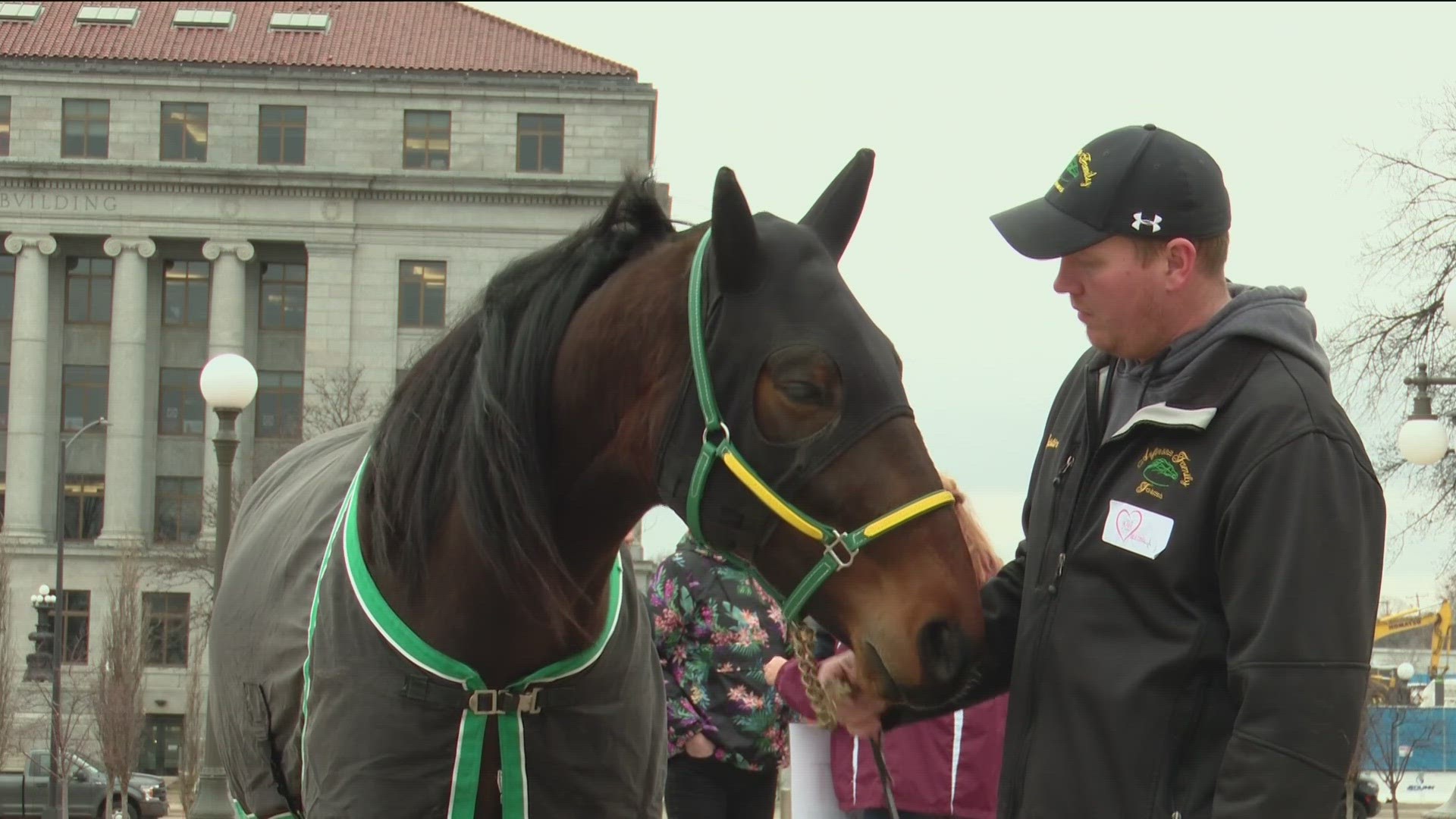SAINT PAUL, Minn. — It's not every day a racehorse shows up at the State Capitol, but it's all part of the drama surrounding what rules Minnesota's racetracks will live under as the state moves toward legalized sports betting.
The gelding named Numbered Account, a harness racer from Running Aces, stood next to his trailer beneath the Capitol steps as onlookers came to greet him. He was there to highlight a different kind of contest, a race against a bill the racetracks say threatens their industry.
"It's devastating and there's so many more people than just us the employees," Running Aces Chief Financial Officers Tracie Wilson told reporters. "You've got communities. You've got people that love to come to the tracks. We're family friendly!"
Wilson was reacting to Rep. Zack Stephenson's bill, HF 5274, which would substantially change the card table operations at Running Aces and Canterbury Park. The bill would limit tracks to traditional card tables, with players standing physically next to the dealers.
It would outlaw the video-assist version of this, known as stadium style card play, in which players sit at terminals with a live video feed of the cards being dealt by a centralized dealer in the card room.
"What it's really allowed people to do is to play games without worrying about what somebody else is gonna do, or how they're gonna talk on the table. And yet it still has, it plays like blackjack. It is a blackjack game," Aaron Bedessem, a Running Aces vice president explained.
The video assist card play has been in use since 2017. But Rep. Stephenson, a Coon Rapids Democrat, contends the video assist version effectively violates the limit in state law of 80 card tables per racetrack.
"Stadium style card games have no such limitation. Not only that, but players can play multiple hands at once, so this technology renders the table limitation in Minnesota statutes meaningless," Stephenson told the House Commerce Committee.
"The problem is there’s no definition of a table in state law. Interblock technology allows one table with one human dealer to serve many, many additional players."
Stephenson's bill would also reverse last week's decision by the Minnesota Racing Commission to allow Running Aces and Canterbury to install new games called Historic Horse Racing, or HHR's, which allow players to place bets on past races.
"I think these slot machines are not lawful at the tracks. I think the Racing Commission took an unlawful action last week when they approved them. And this bill corrects it."
The state's gaming compact with Minnesota's tribal nations restricts slot machines to tribal casinos. But the racetracks assert those machines aren't the same as slots, because there is some skill involved in placing bets based on information the machines provide about the horse's history.
"You can select what horses, and you’ve got handicapping information there, to review in advance of making your bets," Wilson explained.
"Or, you can decide to use the morning line pick, where someone has handicapped the race for you."
The Racing Commission's move was designed to give tracks another source of revenue to help them survive the impact of legalized online sports betting, something that could pass the legislature as early as this year.
"The same people who bet on horses and play cards in our card room are the same people who will be betting online on the new sports betting apps," said Justin Revak, the president of the Minnesota Horsemen's Benevolent & Protective Association.
"If we're not a part of that we feel we should have something in the law that makes up for the losses the state is giving to the tribes."
Stephenson's also carrying the sports betting bill, which gives tribal casinos exclusive rights to both in-person and mobile betting. It doesn't allow racetracks to host those games but provides some revenue-sharing with tracks.
Wilson of Running Aces said her track would need $6 million per year in sports betting revenue to stay afloat. Stephenson's bill would give the racetracks $625,000 per year.
"That's not, obviously, going to work and the racing industry is going to be destroyed we will no longer have racing."
Wilson suggested that Stephenson's bill is retaliation against the tracks for going to the racing commission to get the new machines approved. Stephenson pushed back against that notion.
"Some folks have accused me of having it out for the tracks. That's not true. I've got no problem with the tracks. I do have a problem with the racing commission going beyond its statutory authority."
His bill passed the House Commerce Committee Monday afternoon on a 9-to-8 vote, and heads next to the State and Local Government committee. The one Democrat who voted against it, Rep. Brad Tabke of Shakopee, has both Canterbury and Mystic Lake in his district.

